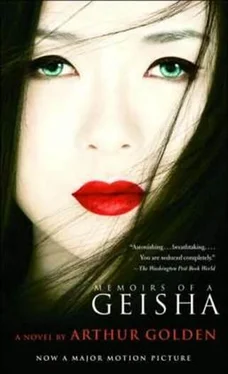When the okiya was livable again, I set out to pay my respects around Gion. I began by calling on Mameha, who was now in a one-room apartment above a pharmacy near the Gion Shrine; since her return a year earlier, she’d had no danna to pay for anything more spacious. She was startled when she first saw me-because of the way my cheekbones protruded, she said. The truth was, I felt just as startled to see her. The beautiful oval of her face was unchanged, but her neck looked sinewy and much too old for her. The strangest thing was that she sometimes held her mouth puckered like an old woman’s, because her teeth, though I could see no difference in them, had been quite loose at one time during the war and still caused her pain.
We talked for a long while, and then I asked if she thought Dances of the Old Capital would resume the following spring. The performances hadn’t been seen in a number of years.
“Oh, why not?” she said. “The theme can be the ‘Dance in the Stream’!”
If you’ve ever visited a hot springs resort or some such place, and been entertained by women masquerading as geisha who are really prostitutes, you’ll understand Mameha’s little joke. A woman who performs the “Dance in the Stream” is really doing a kind of striptease. She pretends to wade into deeper and deeper water, all the while raising her kimono to keep the hem dry, until the men finally see what they’ve been waiting for, and begin to cheer and toast one another with sake.
“With all the American soldiers in Gion these days,” she went on, “English will get you further than dance. Anyway, the Kaburenjo Theater has been turned into a kyabarei .”
I’d never heard this word before, which came from the English “cabaret,” but I learned soon enough what it meant. Even while living with the Arashino family, I’d heard stories about American soldiers and their noisy parties. Still I was shocked when I stepped into the entryway of a teahouse later that afternoon and found-instead of the usual row of men’s shoes at the base of the step-a confusion of army boots, each of which looked as big to me as Mother’s little dog Taku had been. Inside the front entrance hall, the first thing I saw was an American man in his underwear squeezing himself beneath the shelf of an alcove while two geisha, both laughing, tried to pull him out. When I looked at the dark hair on his arms and chest, and even on his back, I had the feeling I’d never seen anything quite so beastly. He’d apparently lost his clothing in a drinking game and was trying to hide, but soon he let the women draw him out by the arms and lead him back down the hall and through a door. I heard whistling and cheering when he entered.
About a week after my return, I was finally ready to make my first appearance as a geisha again. I spent a day rushing from the hairdresser’s to the fortune-teller’s; soaking my hands to remove the last of the stains; and searching all over Gion to find the makeup I needed. Now that I was nearing thirty, I would no longer be expected to wear white makeup except on special occasions. But I did spend a half hour at my makeup stand that day, trying to use different shades of Western-style face powder to hide how thin I’d grown. When Mr. Bekku came to dress me, young Etsuko stood and watched just as I had once watched Hatsumomo; and it was the astonishment in her eyes, more than anything I saw while looking in the mirror, that convinced me I truly looked like a geisha once again.
When at last I set out that evening, all of Gion was blanketed in a beautiful snow so powdery the slightest wind blew the roofs clean. I wore a kimono shawl and carried a lacquered umbrella, so I’m sure I was as unrecognizable as the day I’d visited Gion looking like a peasant. I recognized only about half the geisha I passed. It was easy to tell those who’d lived in Gion before the war, because they gave a little bow of courtesy as they passed, even when they didn’t seem to recognize me. The others didn’t bother with more than a nod.
Seeing soldiers here and there on the streets, I dreaded what I might find when I reached the Ichiriki. But in fact, the entryway was lined with the shiny black shoes worn by officers; and strangely enough, the teahouse seemed quieter than in my days as an apprentice. Nobu hadn’t yet arrived-or at least, I didn’t see any sign of him-but I was shown directly into one of the large rooms on the ground floor and told he would join me there shortly. Ordinarily I would have waited in the maids’ quarters up the hallway, where I could warm my hands and sip a cup of tea; no geisha likes a man to find her idle. But I didn’t mind waiting for Nobu-and besides, I considered it a privilege to spend a few minutes by myself in such a room. I’d been starved for beauty over the past five years, and this was a room that would have astonished you with its loveliness. The walls were covered with a pale yellow silk whose texture gave a kind of presence, and made me feel held by them just as an egg is held by its shell.
I’d expected Nobu to arrive by himself, but when I finally heard him in the hallway, it was clear he’d brought Deputy Minister Sato with him. I didn’t mind if Nobu found me waiting, as I’ve mentioned; but I thought it would be disastrous to give the Minister reason to think I might be unpopular. So I slipped quickly through the adjoining doors into an unused room. As it turned out, this gave me a chance to listen to Nobu struggle to be pleasant.
“Isn’t this quite a room, Minister?” he said. I heard a little grunt in reply. “I requested it especially for you. That painting in the Zen style is really something, don’t you think?” Then after a long silence, Nobu added, “Yes, it’s a beautiful night. Oh, did I already ask if you’ve tasted the Ichiriki Teahouse’s own special brand of sake?”
Things continued in this way, with Nobu probably feeling about as comfortable as an elephant trying to act like a butterfly. When at length I went into the hallway and slid open the door, Nobu seemed very relieved to see me.
I got my first good look at the Minister only after introducing myself and going to kneel at the table. He didn’t look at all familiar, though he’d claimed to have spent hours staring at me. I don’t know how I managed to forget him, because he had a very distinctive appearance; I’ve never seen anyone who had more trouble just lugging his face around. He kept his chin tucked against his breastbone as though he couldn’t quite hold up his head, and he had a peculiar lower jaw that protruded so that his breath seemed to blow right up his nose. After he gave me a little nod and said his name, it was a long while before I heard any sound from him other than grunts, for a grunt seemed to be his way of responding to almost anything.
I did my best to make conversation until the maid rescued us by arriving with a tray of sake. I filled the Minister’s cup and was astonished to watch him pour the sake directly into his lower jaw in the same way he might have poured it into a drain. He shut his mouth for a moment and then opened it again, and the sake was gone, without any of the usual signs people make when they swallow. I wasn’t really sure he’d swallowed at all until he held out his empty cup.
Things went on like this for fifteen minutes or more while I tried to put the Minister at his ease by telling him stories and jokes, and asking him a few questions. But soon I began to think perhaps there was no such thing as “the Minister at his ease.” He never gave me an answer of more than a single word. I suggested we play a drinking game; I even asked if he liked to sing. The longest exchange we had in our first half hour was when the Minister asked if I was a dancer.
“Why, yes, I am. Would the Minister like me to perform a short piece?”
Читать дальше












